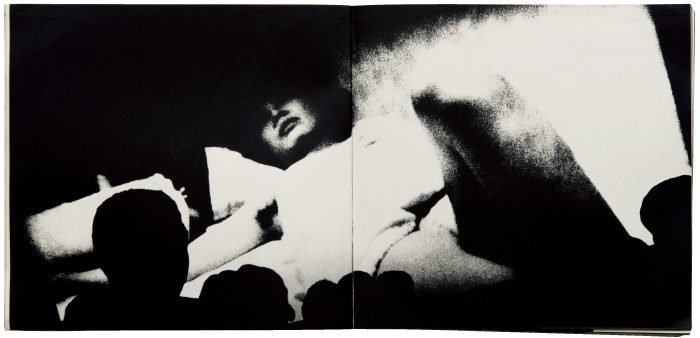A new Terayama / Moriyama publication is now available from online store shashasha.jp
You can look into the book and buy it here.
“Japan, A Photo Theater” is a meticulous recreation of a 1969 collaboration between poet-cineaste-provocateur Shuji Terayama and trail-blazing photographer Daido Moriyama.
Terayama’s text ranges from a sexual fantasy involving his mother to a prose-poem dedicated to 1960s screen goddess Ayako Wakao. There is also a naniwa bushi narrative poem based on the story of Edo era arsonist O-Shichi – but transposed to the era of teenage delinquents and radical students.
Moriyama’s images, in his famed are, bure, boke (“rough, shaky, blurry”) style, depict strippers, vaudevillians, freak shows and other sights of the 1960s Shinjuku streets.
This is a limited edition publication, with each copy signed by the legendary Daido Moriyama himself.
The English translation is by me, Peter Tasker. Once again, you can look into the book and buy it here.
And here is a taster of the text in English.
FOURTH SONG: The Yakuza Code of Honour – Shinjuku Version
I once received a severed pinkie finger in a bottle. A symbol of Masa’s friendship, the finger pickled in alcohol gradually went as pale as wax. “Couldn’t find any medical alcohol, so I just went and used booze instead. I went the extra mile and got some VSOP brandy.”
If you take a husband, make sure he’s on the straight
A yakuza is sure to bring you trouble
These words from Taro Shoji’s “The Traveller’s Sedge Hat” are not strictly accurate, but Masa had lived half his life enduring yakuza woes, finally ending up in the slammer for grievous bodily harm. After that, for some reason, he could never forget the fact that he suffered from the same illness as I did during my long spells in hospital. Obsessively, like someone going through a book of passionate poetry page by page, he worked at developing the friendship, which was the only thing that mattered to him. When I visited him in prison and brought him his favourite salmon slices, he was deeply moved.
“Is there anything I can do for you?” he said. “Just name it!”
“Really?” I said. “Well, there is one thing. I’m interested in the graffiti on the prison walls. Do you think you could copy some and send them to me?”
And indeed after a week or so, the Kokuyo student notebook I had given him came back filled with graffiti copied from the walls. Call it “a jailhouse guest-book” or “an anthology of lived experience”. It occurred to me as I read it that prison is another form of ‘theatre’.
Here I would like to introduce some parts of it, stage directions for a spontaneous drama that will never be performed again. I’d like to dedicate this documentary to my friend Masa, still sleeping behind bars, to his fellow-inmates who might have some pangs of nostalgia if they read it, and to other outlaws of the era…
“The detectives are all twats. Arresting us queers is totally pointless. I’m never going to change. I’ll do you until you’re senseless, you bastards!”
“My name is Goro Matsushita and I’ve been crazy about women since I was a kid. Such was my talent that I was known as Clit-licker Matsushita by the age of fifteen. I’m going to carry on following the Way of the Clit.”
“The glow of fireflies, the gleam of snow on the window.”
If you want to read more, buy the book here.
